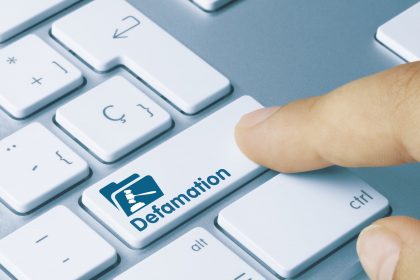
The Ana Kriegel case has once again highlighted the need for Defamation Law awareness after a boy was wrongly identified as one of the teenager’s killers, with his picture and personal details shared online and on various messaging apps.
While the internet and the use of social media has given us a world of content and freedom, with that comes the risk of defamation.
What can you do if you are defamed online?
WHAT IS DEFAMATION?
The traditional definition of defamation was publication of a false statement which subjected a person to hatred, ridicule or contempt. That rather archaic definition has given way to a more modern one: according to the Defamation Act 2009, a defamatory statement is one which tends to injure a person’s reputation in the eyes of reasonable members of society.
Defamation has traditionally been divided into two forms: libel and slander. Historically, libel was the written form of defamation, while slander was the spoken form. The advent of modern technology has made those definitions obsolete. Even though broadcasting is, in one way, a more transient medium than newspapers, the invention of tape and video recorders and the internet means that a false statement can now be preserved in the same way as a newspaper cutting. So today, a defamatory statement broadcast on radio or television or the internet would be regarded as libellous, rather than slanderous. The 2009 Act abolishes the separate torts of libel and slander and replaces them with the “tort of defamation”.
An actionable defamatory statement has three ingredients:
- it must be published,
- it must refer to the complainant and
- it must be false.
DEFENCE TO AN ACTION OF DEFAMATION
- Justification: Truth is always a complete defence to an allegation of defamation. The defence of justification will succeed if the gist of the statement is true, even though certain details may not be accurate
- Privilege: The law recognises that on some occasions an individual’s right to free expression should not be inhibited. Where a potentially defamatory statement is made on such occasion, the maker of a statement will be granted immunity from an action in defamation. There are two forms of privilege in Irish law: absolute privilege and qualified privilege
- Publish interest: The statement must be made on a matter of public interest
- Fair comment: In order to plead fair comment, the publisher must establish that the comment was made in relation to a matter of public interest, that what was said was comment and not a statement of fact, and that the comment was fair, in other words, it was honest
- Apology: While the law of defamation does not recognise defence based on apology or offer of apology, it has the effect of reducing the level of any damages.
WHO IS RESPONSIBLE IF YOU ARE DEFAMED ONLINE?
Material created by users is known as user-generated content (UGC), as distinct from material created and published by the Service Provioder itself, eg Twiiter, Facebook etc. The question for Service Providers is whether they can be liable for UGC that they themselves have not created.
The EU legal framework governing these sites liability for hosting defamatory comments is primarily governed by the so-called ‘notice and takedown’ mechanism. In principle, service providers such as Google will avoid liability when they react quickly to a complaint of defamatory content by removing it.
This immunity from defamation liability is described as a “safe harbour”. Because member states are prohibited from compelling providers to proactively monitor all material they host, the extent of their duty is limited to reacting to complaints.
However, recent judicial decisions have blurred the boundaries of the ‘notice and takedown’ safe harbour and there is now evidence of a trend across Europe whereby courts are imposing greater responsibility on these sites, as we have seen in the Ana Kriegel case.
WHAT YOU SHOULD DO IF YOU ARE DEFAMED ONLINE
In order to make successful claims for defamation on the Internet, a lot of pieces have to fall together. In certain cases this means that whle you may not be able to restore your reputation through legal action, but might be able to recover compensation.
To receive professional legal advice about making claims for defamation on the Internet, we invite you to contact us and discuss the nature of the defamatory comments and the injury they have caused to you, your family or your business.
For further advice or if you wish to discuss any other legal area please contact reception@lynchsolicitors.ie or telephone 052-6124344.
The material contained in this blog is provided for general information purposes only and does not amount to legal or other professional advice. While every care has been taken in the preparation of the information, we advise you to seek specific advice from us about any legal decision or course of action.


I am a Glanbia Dairy Agent so any afternoon is usually good for me to discuss this possible case or what i might do.
If you phone the office, we can set up a meeting that suits.